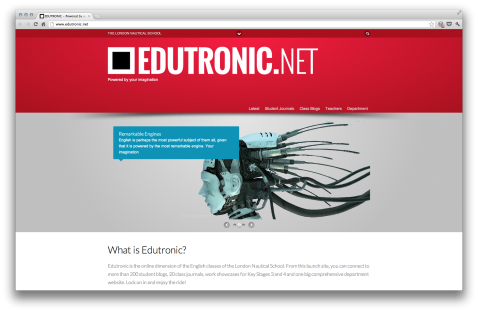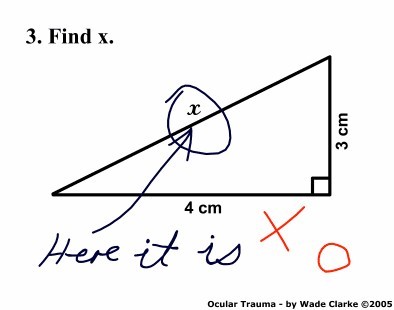Edutronic 2.0
If you have been a faithful follower of this blog over the last 12 months, I thank and salute you – It is continuing into the future in a new form, and via a new address:
Just like this one, there you can sign up for email updates, or simply visit it on occasion. You can syndicate it using RSS or if you want to, you can print and read it. This old journal will stay here indefinitely and you continue to be welcome to access the information and materials and use them as you see fit.
In other news:
- Edutronic has grown into a much larger domain with sites for other classes and an increasingly sophisticated set of resources and materials. Via Edutronic you can also access the English Department site where you can accesss moderated exemplars of student work, year plans, policies and information about the research and new learning initiatives the London Nautical School Department of English are engaged in.
- Student Personal Journal 2.0 – it has gone public: This year, the students’ online journals have been developed and now you have the facility to publish, on your own page with its own address, any work you’d like to make available to the wider world. The control is now yours, and the publish/private choice is entirely yours too. We’re in the frontline of education with this initiative and I’m sure it will be of real interest to many people as it gets going
- GCSE Results for last year’s Year 11 cohort exceeded our expectations and in the English Language paper, our over-all result for students who gained at least a C grade, shot up by 14% to 73% over-all. We are tremendously proud of those boys and we’ve got our work cut out for us to embed and improve on that this year, but I couldn’t be more optimistic that we’ve got what it takes to maintain this meteoric improvement.
If you’re leaving us at this stage of our journey, then we thank you for flying with us, and wish you a very good day
All you need to know…
 This resource site will become an increasingly useful tool in your English learning. You can access it from both home and school and within it you will find a range of helpful material, including:
This resource site will become an increasingly useful tool in your English learning. You can access it from both home and school and within it you will find a range of helpful material, including:
- Supplementary Information relating to what we do in class
- Exam practise materials
- Details of homework
- Glossaries
- Links and interesting diversions
- Details of assignments
- KS4 Programme Summary
- Marking criteria
- Examples of excellent student work
Mr Waugh.
Presentational Devices
For anyone uncertain of how to tackle the presentational devices section of the Non-Fiction Reading section of the English Literature Examination – here is a quick guide:
Preparation for the Examinations
Dates:
The English Examinations are happening on the following dates:
- TUESDAY 22nd May: Literature (a) – Of Mice and Men and Touching the Void
- THURSDAY 24th May: Literature (b) – Poetry “Conflict” Comparison and Unfamiliar Poem
- TUESDAY 29th May: Language – Non-Fiction Reading and Writing
- Literature (a): Monday 21st May – All day
- Literature (b): Wednesday 23 May – All day
- Language: Friday 25th May – All day
Best Practice Preparation:
The best preparation you can do for these examinations is practice answering the prior exam questions. You have received a number of these from me in class, but if you need to find more, you can easily access past papers at the AQA English Language and English Literature sites. (It is often a good idea to have a look at old papers simply as a way to become more familiar with their format)
If you write practice papers on your online journal, I guarantee you will receive detailed written feedback from me – usually within minutes, but at most, within 24 hours.
Always contact or come and see me if you have questions.
There is a wealth of revision information online and many study guides that can help guide your prep – but at this stage one of the most important messages we can give you is to trust your own learning and knowledge and practise the WRITING side of the exam. Instead, go to your online journal and view some of your own past work and read the detailed feedback – making sure you understand your own personal next steps.
Personal Wellbeing:
Just like a big game, an examination asks a lot of you mentally and physically. Don’t let yourself down on the day by arriving late, tired or hungry. Get into the habit of eating a decent breakfast and get some decent sleep. Avoid excessive socialising in the weekends leading up to the big day – but still keep in mind that rest is as important as revision in the week leading up to a big exam.
Be positive. Remember all the impressive progress you’ve made. Believe in yourself. Pay close attention to the questions. Trust your own responses. Give evidence for everything.
Don’t get stressed that 11 years of your life and hundreds of thousands of pounds have been spent on educating you so that you can achieve in these few small examinations. Just be yourself – the smartest, most eloquent, most intelligent, version of yourself.
Definitely wear your best tie.
Exam Marking Schedules
You’ve now received the marked papers for your mock exam – you can access the marking schedules from the following link to see what is expected and identify your areas for improvement.
Tosin’s Analysis of “The Yellow Palm”
The poem ‘The Yellow Palm’ is a poem portraying the problems which are present in Bagdad, Iraq; the problems the author experienced. I personally think that the poem shows the experiences which are experienced when walking down ‘Palestine Street’. What can be seen, what happens and how it happens.
In the poem, there is a lot of references which seem to relay the message that there was a lot of heartache in Palestine and that in just one street, all of these tragedies could occur. However, what is Palestine, and why is there a war there? Palestine is an area and Palestinians are the people which live in it. The current conflict is between the Palestinians and the Israelis. The Israelis do not want the Palestinians in Palestine as they believe it is their territory.
So, the heartache quotes. In the first verse, the person narrating the poem (most probably the author) begins to speak of the things which he was seeing ‘I watched a funeral pass’, ‘blood on the walls’ (of a mosque), ‘met two blind beggars’. These quotes seem to suggest that Palestine at the time was a very broken area if you like. There was a lot of struggle.
‘I met two blind beggars // and into their hands I pressed my hands // with a hundred black dinars’’. This quote is an act of support in the sense that, the person saw people who are less well off than he is and therefore decided to give them money, even considering the circumstances that the area is in. The author has used this to show that there is a glimmer of hope and that there is a light at the end of the tunnel.
The theme of the poem seems to revolve around the colour yellow, even in the title of the poem yellow is included. Yellow can mean many things, happy – a sunny day. We associate yellow with negative things also as well, such as the yellow of a dead white person; decaying skin. This association is what I think the author has decided to include in this poem. The effect of ‘dead’ is what is pictured when I read this poem.
Also, yellow can resemble a desert; wasteland. A territory which has being run down by the negative conflict which ‘lingers in the air’. The author has made the theme of the poem yellow to create an uninhabited, an inhospitable place to be in.
Poetic Language Glossary
The following is a quick glossary of language terms often used in the analysis of poetry. Please never use a term you are unsure of in an examination. It is always better to explain what you understand is happening in the language in your own words rather than attempt to use fancy technical terms and use them incorrectly.
Poetry “Conflict Cluster” Practise Exercise – Prior Examination Question
Your homework – preferably online if possible – is to answer the following question (derived from a previous examination) and check it against the official examiner’s marking rubric published below.
Either:
Compare how poets present the effects of conflict in “Belfast Confetti” and one other poem from Conflict
Or:
Compare how poets present the experience of soldiers in ‘Bayonet Charge’ and one other poem from Conflict
What grade would it have been given?
Jack’s Analysis of “Belfast Confetti”
Link to Edutronic.net for all new materials for 2012 related to GCSE English Language and Literature
Belfast Confetti
The poem ‘Belfast Confetti’ depicts the aftermath of a bomb during the troubles that people in Belfast experienced. The title ‘Belfast Confetti’ is a title that has a dual meaning. On one hand the homemade bombs that the IRA used are referred to as Belfast confetti due to the nuts and bolts they put in for shrapnel. The second is more complex. Confetti is usually used in times of celebration such as weddings, which is strange as the poem is about something completely opposite to a celebration. It is usually thrown over the head of the bride and groom, so it rains down on them. Carson may be using that title to create a metaphor, the nuts and bolts flew over the head of people just as confetti does.
Carson presents the poem with extensive references to punctuation marks using words such as ‘Exclamation marks’ and ‘Sentence’. “It was raining exclamation marks” this is trying to depict the noises made by the falling shrapnel. Exclamation marks are used generally when someone is shouting or when a word needs to be emphasised. As you can imagine the noise of the bomb and the chaos it caused must have had a huge affect on the noises that were heard, people were screaming, sirens were going off and fires were blazing. So like the title you have to delve deeper into the meaning of these words which really give you an understanding of the poem. There is a chaos to the poem that matches this experience.
Ciaran Carson also does not present any type of metre or rhythm, this is because he wanted the poem to be seen and read with confusion like the people felt after the bomb was detonated. This gives the poem more reality than it would do if there was a clear structure to it.
Looking at most lines in the poem, we see a trend of paradoxes and dual meanings. For example “All the alleyways and side streets blocked with stops and colons” on the outside this line tells us that escape was blocked and there was no way out of the chaos. Although looking at the line with more depth we can discover that what is trying to be said is that there is no way to escape the violence in general. Using the word “stops” and “colons” could refer to the writers own beliefs. Carson may be trying to get a message across that all is being done to stop these attacks is through the Governments use of meetings and laws. Ironically, I believe the author is trying to say we need to tackle this violence with actions rather than letters and talks, hence the quote “Alleyways and side streets blocked by stops and colons” meaning escape is blocked by lack of action.
Another example of these paradoxes is the line “I know this labyrinth so well – Balaklava, Raglan, Inkerman, Odessa street” This quote tells us that the author has a connection to those streets and he knows his way around. Carson also compares the streets to a labyrinth. the word labyrinth is derived from Greek mythology, it was a place where a Man eating Minotaur lived and was said to be built like a maze. This tells us that the streets were like a maze ,probably due to the chaos, and that there were dead people around. We could associate the Minotaur with the bomb as it is the cause of the deaths and the streets to be its home as it is the place he kills.
To conclude I would like to explain to you what my view is on the overall message of the poem. The poems message is to educate the readers of what it was like to be involved in a bombing. I also believe that the poem is trying to get across a message of invasion. His hometown was getting destroyed in front of him and the only way he believed he could teach people about this was through poetry. The fact that he chose to express his emotions through poetry is a really great way of getting your point across, as not many people read a poem and look at what is on the surface they want to peel of the obvious and explore the unknown.


